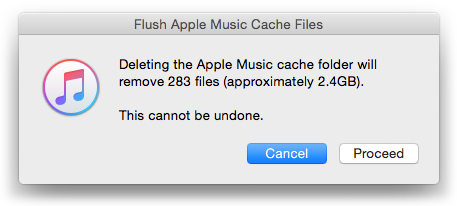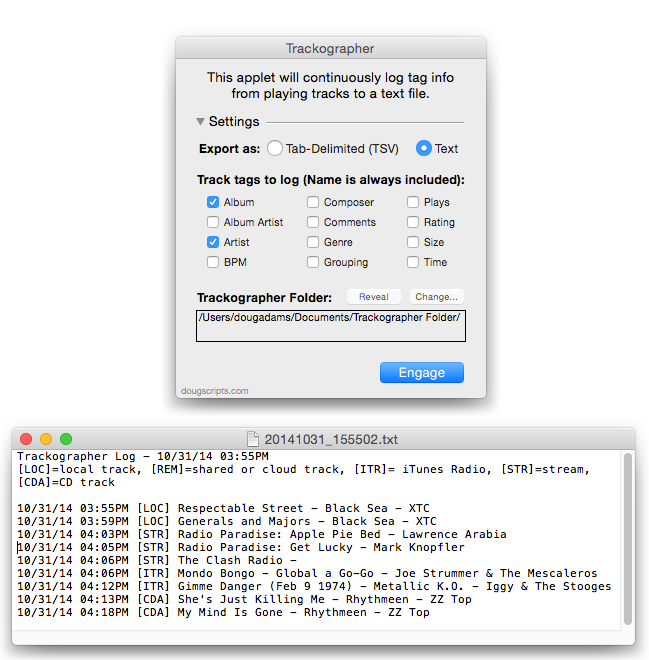Miscellaneous
NEW: Flush Apple Music Cache Files
The first wave of Apple Music trials will be expiring soon and if you haven't subscribed for real it means saying so long to any Apple Music added to your iTunes library.
But as Kirk pointed out a while back, there may be some residual files left over in the ~/Library/Caches/com.apple.iTunes/SubscriptionPlayCache/ folder, which is sort of like an "iTunes Media" folder for Apple Music. It stores the specially protected audio files that are downloaded when you play a track from Apple Music on your Mac, ostensibly so iTunes doesn't have to re-download them if they are played again. They can't be user-played and are only useful to Apple Music. (This cache folder doesn't apply to Radio music. Or to Apple Music you've added to your library for offline use, which is stored in your official "ITunes Media" folder.)
I'm not sure if these files will disappear when the trial ends for you. iTunes doesn't appear to remove them even now, so if you've used Apple Music a lot then this folder will be loaded with quite a number of full-sized audio files. I'm a sucker for some of those "For You" playlists and I've managed to get my own cache folder up to about 7GB.
Flush Apple Music Cache Files is a simple script that will show the number of files in the cache and the space they take up and, if you wish, delete them:

And if you're subscribing to Apple Music and are tight on drive space, you can flush all you want anytime. Apple Music will re-download any music it requires again later.
Download the script from this page.
Script of the Day: Trackographer
Trackographer will monitor iTunes and send tag and time-of-play information of each track that plays (including iTunes Radio and internet radio streams if they provide track info) to a text file.

Preferences can be set to include or not include various basic tags and to create a plain text file or a tab-delimited text file which can be imported into a spreadsheet.
More information and download is on this page.
Previous Scripts of the Day. Subscribe to my RSS feed or follow @dougscripts on Twitter to get daily "Script of the Day" notifications.
UPDATED: Trackographer v2.0
Trackographer v2.0 is a stay-open applet that will monitor iTunes as tracks are playing and send tag information from each playing track (including radio streams if they provide track info) to a text file. Preferences can be set to include or not include various basic tags and to create a plain text file or a tab-delimited text file which can be imported into a spreadsheet. The text output looks something like this:

This latest version is a maintenance update that fixes some issues with text not rendering properly in modern OS's.
NEW: Have a Quick Look v1.0
Inspired by this recent Mac OS X Hint, I've posted Have a Quick Look. This script uses the UNIX qlmanage command to display a Quick Look window of the selected iTunes track(s), which can be audio, video, and, perhaps most usefully, PDF, whereby Preview.app is not necessary. Need I add that a keyboard shortcut makes this very handy.
Size of Files, Size of Library
It's not the size of your "iTunes Media" files that best describes how big your media file collection is. Often, querying Correspondents will report that their iTunes Media folder is so many GBs (or so many days-worth). But if that total includes a lot of video then the number of files is smaller than the same-sized folder containing just 128kbps audio files (eg: my "Star Trek" with Extras at 6GB+ is a little smaller than my "Compilations" folder which contains over a thousand files). Very few of my scripts and apps directly work on the files in the iTunes Media folder anyway, so in many cases its size is irrelevant; scripts work with tracks in iTunes, so the number of tracks is more important than the size of their files. A better relative measurement for comparison purposes is the size of your "iTunes Music Library.xml" file (located in ~/Music/iTunes). It has an entry for each track in your library and all (well, most) playlists. Therefore, the more tracks and playlists you have the larger the XML file will be.
UPDATED: I Hate That iTunes Done Chime! v2.0
OK. I suppose I don't actually hate it. But you might find it convenient to change the "done" chime that sounds whenever you import or convert files in iTunes. I Hate That iTunes Done Chime! v2.0 will let you select a new sound to replace "boodely-OOP!" -- which is actually named "complete.aif". You can choose from any of the default system sounds (ping, sosumi, submarine, and so on), no sound, or your own AIFF sound file.
This latest version is simply a maintenance release and is saved as universal binary.
